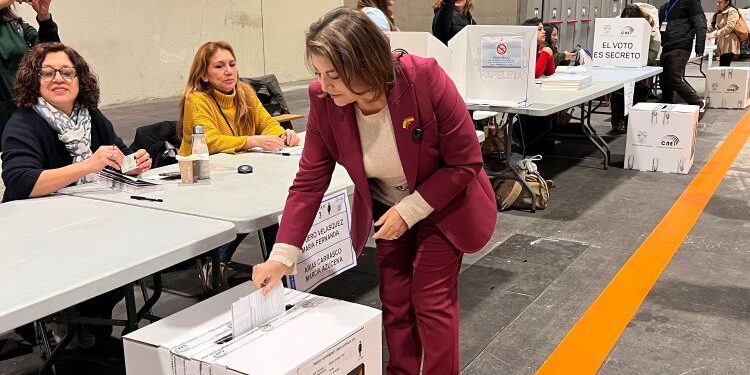Eduardo González
Thirty percent of Ecuadorians residing in Spain participated on November 16 in the referendum called by President Daniel Noboa to decide, among other issues, whether to initiate a new constitutional process and whether to allow the presence of foreign military bases in the country. The president’s proposals were ultimately rejected by the entire nation.
A total of 196,249 Ecuadorians were eligible to participate in the referendum at 19 polling stations set up throughout Spain, located in the main cities with large Ecuadorian communities.
During this process, citizens were able to vote on four official questions approved by Ecuador’s National Electoral Council (CNE): elimination of the prohibition on establishing or ceding foreign military bases (A), elimination of state funding for political parties and movements (B), modification of the electoral system and number of assembly members (C), and convening and installing a Constituent Assembly to draft a new Constitution (D).
According to the Ecuadorian Embassy in Madrid, the historical average participation in popular consultations and referendums in Spain, where voting is not mandatory for Ecuadorian migrants, has historically been around 20-25%. In the election held on November 16, nearly 60,000 citizens, 30% of the electorate, went to the polls, representing a record turnout.
In the case of the Madrid polling station, the largest in Spain, nearly 27,000 Ecuadorians (34% of the electorate) cast their votes in Pavilion 14 of IFEMA. In Spain, the “Yes” vote among Ecuadorian migrants averaged 49-51% on questions B, C, and D, in contrast to question A, which garnered 46% support compared to 53% who voted “No.” At polling stations in Ecuadorian consulates in Madrid, Barcelona, Mallorca, and Málaga, the “Yes” vote averaged 50-55%.
Nearly 14 million Ecuadorians voted across the country’s 24 provinces. Although President Noboa had received permission from the National Assembly to campaign for the “Yes” vote until Thursday, November 13, the outcome was unfavorable to the government’s intentions, with the “No” vote prevailing with over 60% of the vote in 16 of the 17 provinces. Both the opposition supporters of former President Correa and the Confederation of Indigenous Nationalities of Ecuador (CONAIE) had called for a “No” vote.
Specifically, 61.65 percent of Ecuadorians voted against the establishment of a Constituent Assembly to draft a new Constitution, and 60.64 percent voted against eliminating the ban on establishing foreign military bases. The other two questions were also rejected.
One of Noboa’s objectives was to draft a new Constitution that would supersede the 2008 Constitution, approved during the presidency of Rafael Correa (2007-2017). The referendum coincided with a sharp increase in violence, one of Noboa’s major battlegrounds since taking office in 2013.
The United States government was particularly interested in having Ecuadorians authorize the installation of its military bases in the country, as it had previously done in the Galápagos Islands during World War II and in the coastal city of Manta between 1999 and 2009. Correa’s current Constitution prohibits the presence of foreign forces in Ecuador.







